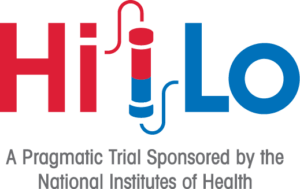
The HiLo study seeks to determine the optimal phosphate level for patients with chronic kidney disease.
A paper outlining the design of and rationale for DCRI-led pragmatic trial HiLo was recently published in the American Journal of Kidney Diseases.
The trial, which is led by DCRI nephrologist Myles Wolf, MD, MMSc, is being conducted to determine the optimal phosphate target when caring for patients with kidney failure who are receiving routine dialysis. These patients are at high risk of hyperphosphatemia, or over-elevated phosphate levels, which can lead to poor clinical outcomes. However, no studies have been done to determine whether overly aggressive phosphate management could lead to negative outcomes for these patients.

HiLo was developed as one of the Demonstration Projects within the NIH Health Care Systems Research Collaboratory, which provides a testing ground for novel and pragmatic approaches to clinical research. The NIH Collaboratory, which includes trials from across the U.S., is coordinated by the Duke Clinical Research Institute (DCRI).
“HiLo will allow us to answer an important clinical question in an efficient way, which will enable the nephrology community to improve patient care more quickly,” Wolf said. “HiLo is a great example of the DCRI’s commitment to creative trial design and its teams’ willingness to try new things.”
The trial’s pragmatic design enables the study team to reduce the burden and cost that would be associated with a typical clinical trial. Pragmatic features of HiLo include:
- The study has broad eligibility criteria, allowing anyone over age 18 who receives dialysis thrice weekly at a participating U.S. dialysis center to enroll.
- The study uses eConsent pre-loaded onto tablet devices to simplify enrollment.
- To streamline trial operations, study participants are randomized at the dialysis clinic level rather than the individual level. Between 80 and 120 clinics will be randomized in the study.
- Data collection and other research activities occur during a patient’s routine clinical care. This “weaving of research protocols into the fabric of daily clinical practice” will also help enable study results to be quickly translated into clinical practice.
- Trial data is also collected from the electronic health record (EHR).
- The study’s bioinformatics team created portals that can receive monthly data transfers from dialysis sites and collect them in a single study database, a solution that eliminated the need for case report forms.

“The status quo of kidney care is often based on a house of cards of low-quality, small-scale observational data,” said DCRI nephrologist Daniel Edmonston, MD, who is also working on the trial and contributed to the design paper. “HiLo has a chance to generate quality evidence to answer an issue which affects all hemodialysis patients. This study also heralds a new focus on pragmatic trial designs in nephrology with real-world inclusion criteria and generalizable data.”
DCRI’s Hrishikesh Chakraborty, DrPH, leads biostatistics for the study and was also part of the writing group for this paper. Other DCRI members of the study team include Peter Merrill, PhD; Yashika Johnson, MA; Andy Mackelfresh, MBA; Davy Andersen, MHA; Laura Johnson, MHS, PMP; and James Topping, MS.